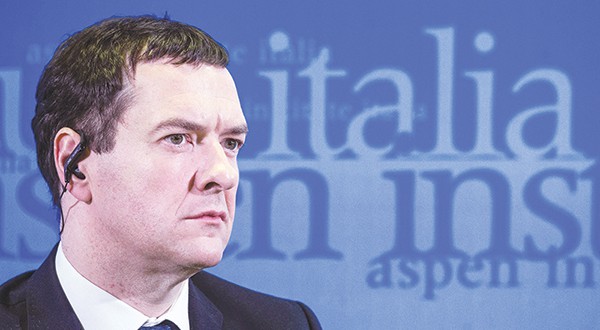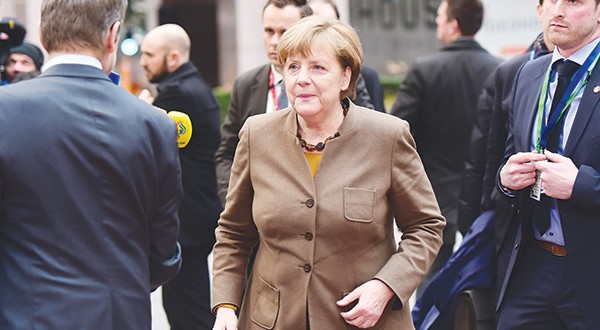Admin
February 18, 2016 News
Alkesh Sharma / Emirates Business Thanks to UAV (unmanned aerial vehicle) technology, soon UAE-based agriculturists and investors will be able to monitor their sprawling farmlands situated as far as in Sudan, without even stepping out of their homes. Under the concept of remote ownership, this could be made possible through smart drones that would do daily monitoring of faraway meadows …
Read More »
Admin
February 18, 2016 News
London / AFP Britons’ satisfaction with Chancellor of the Exchequer George Osborne is waning as he prepares for his annual Budget amid warnings a slowdown in global growth could hurt the U.K. economy. Forty percent of people surveyed by Ipsos Mori are happy with his stewardship of the economy, down 4 points percentage points from July. Forty-six percent are dissatisfied, …
Read More »
Admin
February 18, 2016 News
Berlin / Bloomberg German Chancellor Angela Merkel’s coalition backed a resolution calling for a complete separation of the European Central Bank’s supervision of financial institutions from its monetary policy role. The lower house of parliament on Thursday voted in favor of the motion, which also urges the government to ensure that small, lower-risk institutions such as cooperative and savings banks …
Read More »
Admin
February 18, 2016 News
Brussels / AFP British Prime Minister David Cameron threatened to walk away on Thursday from a “make or break” EU summit without a deal as his counterparts warned they would not pay any price to stop Britain crashing out of the bloc. “I’ll be battling for Britain. If we can get a good deal I’ll take that deal but I …
Read More »
Admin
February 18, 2016 News
Kiev / AFP Kiev vowed on Thursday to “decisively” fight Russia’s demand for the full repayment of a $3-billion (€2.7-billion) loan it issued to Ukraine under since-ousted Moscow-backed president Viktor Yanukovych in 2013. Russia on Wednesday filed a lawsuit with the High Court in London after the two sides failed to reach a private settlement over the debt. The eurobond …
Read More »
Admin
February 18, 2016 News, Uncategorized
MOSCOW / Bloomberg After deflecting pressure in 2015 with salary reductions, part-time work and unpaid vacations, companies are increasingly opting to cut jobs as the economy enters its second year of contraction. As Russia’s biggest companies from carmaker AvtoVAZ to nuclear plant operator Rosenergoatom plan job cuts, Labor Minister Maxim Topilin predicts unemployment reaching the highest since 2013 by mid-year. …
Read More »
Admin
February 18, 2016 News
Bloomberg Hungary’s central bank, already facing criticism for a spending spree ranging from real estate to fine art, is now beefing up its security force, citing Europe’s migrant crisis and potential bomb threats among the reasons. The National Bank of Hungary bought 200,000 rounds of live ammunition and 112 handguns for its security company. Additional protection is needed due to …
Read More »
Admin
February 18, 2016 News, Uncategorized
Cairo / WAM Sultan bin Saeed Al Mansouri, Minister of Economy of the UAE, has called for stronger joint pan-Arab economic action to counter current challenges, eliminate obstacles to intra-Arab trade and investment and speed up innovation and creativity to achieve economic diversification, development and prosperity. The UAE takes great interest in the issues of joint Arab action as a …
Read More »
Admin
February 18, 2016 News
DUBAI / WAM Dubai Women Establishment (DWE) and NMC Healthcare on Thursday signed a partnership agreement at the Government of Dubai Media Office. According to the agreement, NMC, the Platinum partner will support a pack of innovative health initiatives during the Global Women’s Forum Dubai 2016. Dr. Oz, Vice-Chair and Professor of Surgery at Columbia University and directs the Cardiovascular …
Read More »
Admin
February 18, 2016 News
DUBAI / WAM Dubai Electricity and Water Authority (DEWA) has received ISO 10002:2014 certification for providing guidance on the process for handling complaints about planning, design, operation, maintenance, and improvement of services. This accomplishment reflects DEWA’s commitment to employing the highest standards of availability, reliability and efficiency when providing customers with services that adhere to the highest standards of excellence. …
Read More »

 The Gulf Time Newspaper One of the finest business newspapers in the UAE brought to you by our professional writers and editors.
The Gulf Time Newspaper One of the finest business newspapers in the UAE brought to you by our professional writers and editors.





